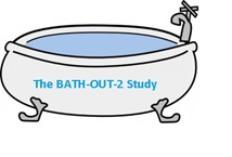Bathing adaptations in the homes of older adults: A randomised controlled trial, economic evaluation and process evaluation (BATH-OUT-2)
Sometimes older people may become unable to use the bath or shower at home because it is difficult to get in and out of. Difficulties with bathing can often be followed by difficulties with other daily activities such as dressing, toileting or walking. An occupational therapist may recommend that they have a ‘walk-in’ shower put in. This may enable the person to continue to manage their personal care without help. It may also make it less likely that they have an accident or fall. However, there are often long waiting times for walk-in showers to be installed. Waiting times vary across the country and may be up to two years in some local authorities. Older people may lose some of their independence with these activities while they are waiting. This might also mean that they end up needing more help from family, friends or paid care workers.
There is limited research on how walk-in showers may help people to manage their personal care as they get older. We want to find out whether having a walk-in shower improves or maintains older people’s health, safety, quality of life, and ability to manage their personal care.
We want to answer two important questions: is the provision of walk-in showers effective? If so, is quicker provision more effective?
Objectives
This study aims to explore whether having a walk-in shower improves or maintains older people’s health, safety, quality of life, and ability to manage their personal care. It will also explore whether delayed installation has a negative effect on older people’s physical and mental health and independence, and also leads to more costs.
Outcomes
The primary outcome measure will be the Physical Component Summary score (PCS) of the SF-36.
Participants
We aim to recruit three hundred and sixty people aged 65 and over across four regions, who have been referred to the council’s adaptations service for a walk-in shower. We will use paired randomisation to allocate half to begin the process for walk-in shower installation immediately; the other half will be added to the usual waitlist before the shower is installed. The two groups will be compared at four follow up time points across twelve months based on shower installation dates.
Privacy Notice: How we use your research data
Funding
| Funder(s): | NIHR School for Social Care Research (SSC) |
|---|---|
| Start Date: | December 2020 |
| End Date: | July 2023 |
Members
YTU Team
- Adwoa Parker, Trial Manager
- Laura Doherty, Trial Support Officer
- Izzy Coleman, Statistician
- David Torgerson, Director, York Trials Unit
- Caroline Fairhurst, Senior Statistician, York Trials Unit
- Natasha Mitchell, Assistant Professor, York Trials Unit
External Members
- Phillip Whitehead, Chief Investigator, University of Northumbria at Newcastle
- Sue Adams, Care & Repair England
- Stuart Belshaw, PPI Representative
- Sandra Francis-Farrel, Nottingham City Council
- Joanne Gray, Northumbria University at Newcastle
- Miriam Golding-Day, University of Nottingham
- Jane Horne, University of Nottingham
- Peter McMeekin, Northumbria University at Newcastle
- Tim Rapley, Northumbria University at Newcastle
- Rachel Russell, Calderdale Metropolitan Borough Council
Trial Details
Sponsor: University of Northumbria at Newcastle
REC reference: London – Camberwell St Giles - 21/LO/0044



